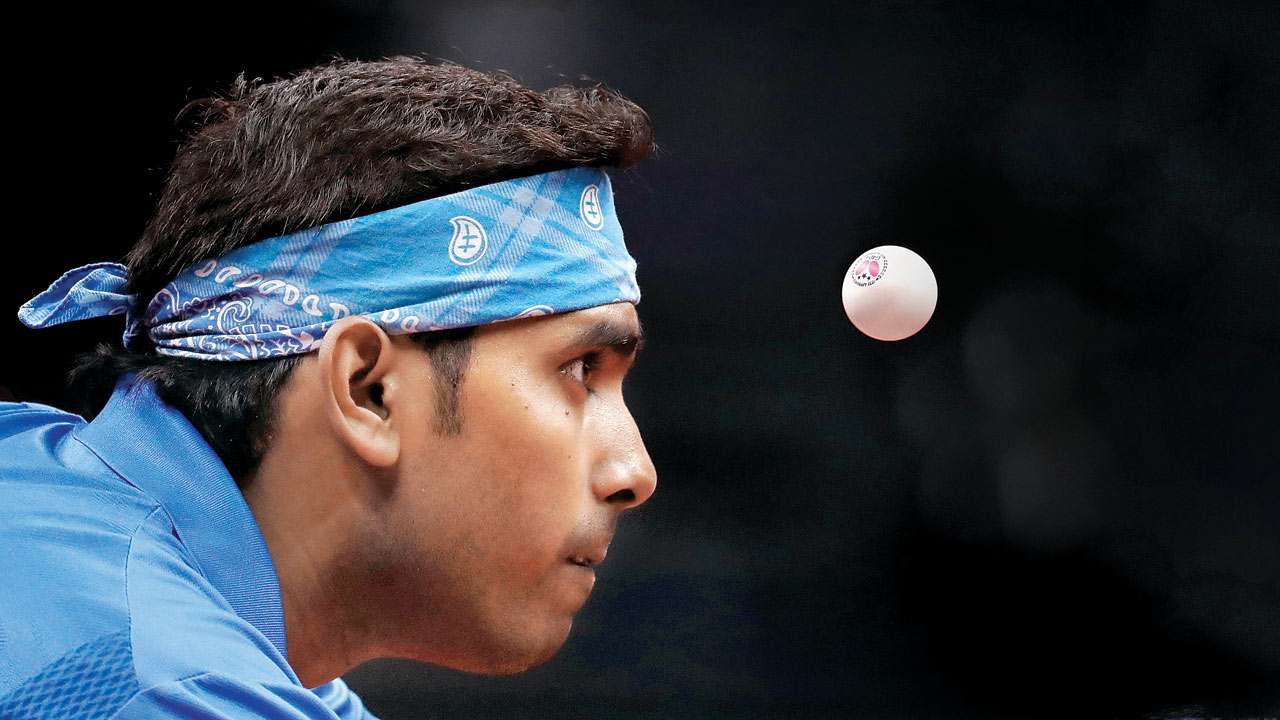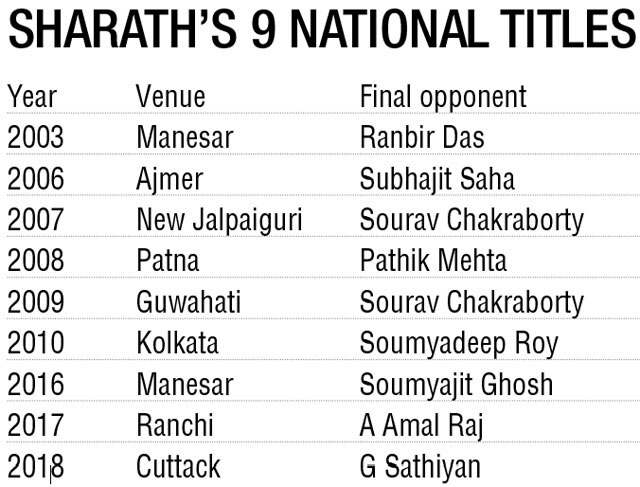
Ace Indian paddler Sharath Kamal talks to Rutvick Mehta about winning record-breaking 9th National title, what keeps his hunger going even in domestic tournaments and why he cares more about popularity of the sport than him as an individual. Excerpts from a free-wheeling chat
Sharath Kamal placed his hands on his head, fell on to his knees, collapsed on the ground and lay there for a good 10 seconds. Then, after hugging his opponent and taking a round of the table, he thundered a loud roar with both his arms up in the air. The dramatic celebration provided a glimpse of what it meant for Sharath to win a ninth singles National title, with a topsy-turvy 4-3 (11-13 11-5 11-6 5-11 10-12 11-6 14-12) victory over G Sathiyan in a high-pressure and high-quality title clash in Cuttack earlier this year. The triumph not only broke Kamlesh Mehta's long-standing record of eight National titles, it also etched Sharath's name as the GOAT of Indian table tennis. In this chat with DNA, the world No. 30 talks about all of that and more:
Winning the title is more than satisfying, especially playing against Sathiyan who has been the man in form. He is just behind me (ranked world No. 31), and he has been playing well, beating some top players lately. He was the man to beat in this Nationals as well as the last Nationals. Even before I went into the match, I put him as a favourite. I think that took some pressure off me. So, I'm incrediblly happy to win the title. For me, winning is very important.
To answer your second question, I didn't want to make the record. People around me wanted me to make the record. That added a lot of pressure on me. My brother had some family commitments during the Nationals, and he asked me whether he should cancel those and come with me before I left. I said, 'No bro, I'll be fine. It's not like I badly want to win this one. It will be good to win, of course, but it's not like I want to win and make that record'. But then I go into the tournament, and everybody is only talking about that. It got into my head, it really did.
It's difficult. You really can't zone yourself out. That is also a reason why I lost (Nationals) for a few years in between. I go to the tournament, and everybody is like, 'Oh, you'll win the tournament'. And I'm like, you think the other guys are just swatting flies or what?
I said, I will win it. I just try to keep quiet at first, and then either I'll try to shut them off or just accept it. In a way, I found out that accepting it is much easier than shutting them off, because shutting it off takes a lot of energy. I needed to be away from all that.
I called my brother on Tuesday afternoon, and I said, 'One more day left. I'm not expecting that much trouble on Tuesday, but on Wednesday (day of the final), I'll need your help'. I told him I would like you to be here. 'Take the next flight,' I said. And he said, 'I was actually thinking of that as well'. So, he just took the next flight and got to Cuttack. I think it helped me, just having somebody in the corner. Not only while playing the match, but also when I was all alone. When you're alone, you tend to overthink.
See, it wasn't like, 'Arre, I want to win the 9th title. I need to make that record'. Of course, in the end, it's good to hear that I'm the only person to do that and stuff like that. But I always told myself to have better international records because that is something I can tell younger kids to dream of. It's much bigger than winning a National title.
A few years ago, when everybody told me that I need to beat Kamlesh Mehta's record, I said, 'Nahi yaar, let that be Kamlesh Mehta's record itself'. Because the kind of dedication he has put in, and to be an eight-time national champion when he was not the best out of the lot is amazing. For me, I have been the best out of the lot for the last 4-5 years, there was nobody to even challenge me. So, winning titles in those years wasn't difficult at all.
So, I thought let the record be with him. But then people around me were talking about it so much, they wanted me to do it. It started from last year, when I equalled it. But this year, it was just too much. Right from my father to the umpires to the assistant coaches in my club to spectators to well-wishers, everybody just came up to me and said, 'ninth title'. And I was like, 'How does it matter, man?'
All this kept playing in my mind, and that is why winning the title became more important. I had to win it for others than for myself. In Lucknow when I lost (2011 final), that was the first time when I lost after winning five times in a row. Some people around me were in tears, and some others were so disappointed. I felt that I let them down so much. It hit me really hard. So, from there, to see this kind of joy is special. The whole stadium was cheering for me. Poor Sathiyan, I feel sorry for him.
The major change is that I've become more responsible. People look up to me now. I need to mentor, I need to motivate, I need to inspire. Earlier, everything that I did was only for myself and my coaches.
Through the whole journey, every title has had a different story. Except for a period when I won it five times in a row, there it was pretty obvious that I would win.
The most difficult one was the seventh title (in 2016), because after the sixth title, I had a break of five years and I kept losing. I wanted to win personally for myself. So, in terms of the achievement and its context, the seventh title was bigger for me than this.
Firstly, everybody keeps asking why play in the Nationals. The basic rule is that playing Nationals is mandatory to be selected in the Indian team.
The secondary thing is that in TT, we still have respect for national championships. I have missed just one Nationals, and there was so much controversy on that. Thus, even the best players play the Nationals, and that way, the tradition is kept alive. And for me, personally, every tournament that I play, I want to win. That's my character.
Lastly, and one of the more important reasons, is this: Youngsters only hear about what you're doing internationally. However, Nationals is one tournament where aspiring players see us in action. I think that, we need to give it to them. For example, (PV) Sindhu and Saina (Nehwal), if they're playing in front of you and as a kid you're watching them, the kids will be inspired in a different way rather than just seeing them on TV or hearing about their achievements. So, it boils down to giving it back to the sport. If I'm telling youngsters to do things in a certain way, I need to stand there as an example. They need to see me do it, so that it's easier for them to do it. I want to play these tournaments in India so that I'm there if the aspiring players need me. Just probably seeing me or talking to me, it inspires them to think that one day, I would also like to be like him.
(Pauses) Well, yeah, everyone is talking about it. And that is mostly thanks to social media. Especially this time when I won, out of the blue so many people like my classmates sent me congratulatory messages. I felt like I had won an Olympic medal. But then that's the power of social media. That is what I would say Kamlesh Sir didn't have.
It's good for the sport. Lot more people know about TT now, especially after 2018. We are able to see lot of TT in the news, which helps the sport evolve into a bigger sport. I can only hope that we continue to produce big results at the international level so that it drastically improves the popularity of the sport.
See, at the end of the day, it is all about the sport. My identity is table tennis, table tennis' identity is not Sharath Kamal. Today it is Sharath Kamal, probably a few years ago it was Kamlesh Mehta. Table tennis is constant, only the players are changing. So, the game has to keep improving. Probably, yes, these 10-15 years that I've been around, people know Sharath Kamal. But then, 30 years down the line, when somebody says I'm a table tennis player, they will relate it to what Sharath Kamal did or Kamlesh Mehta did. It'll never be the opposite.
So, the game is bigger and we all need to try and focus on improving the game. Of course, as individuals we always try and do that but, in the end, it's all for the sport and for the country.
Exactly. There's too much pressure now, because we've done very well in 2018. So everybody now is like, 'Oh OK, we can win an Olympic medal in table tennis'. And I'm like, 'Calm down, let's take it step by step'.
This is the Olympic qualifiers year. So this year, there will be a lot of Pro Tour and world ranking tournaments that add up to the world rankings, which in turn will help in easier qualification process for the Olympics. Apart from that, world championships, Asian championships and Commonwealth championships are the three major events. So yes, the calender is full. I don't think my wife will be very happy. I hope she's not seeing a lawyer (laughs).

Sharath Kamal and Manika Batra, who won India's first-ever table tennis mixed doubles Asian Games medal last year, team up to bag the National mixed doubles title as well. Sharath said the duo has chalked out a plan to train together and play mixed doubles in Pro Tours in order to qualify for the 2020 Tokyo Olympics as a pair. "We want to qualify for the 2020 Olympics. At the Olympics, there will be 16 pairs only. So, actually, qualifying for it will be more difficult than winning a medal at the Games. We have chalked out a plan where we will also practice mixed doubles once a while, probably I'll go to Delhi or she'll come down to Chennai or we'll go to Europe together. We'll try and combine our singles practice with mixed doubles," Sharath said. "Playing together in Pro Tours is important. We played mixed doubles in Nationals because we will be playing together in Hungary starting next week, for it has points for the Olympic qualifiers. The highest possiblity of getting a medal at the Olympics is in mixed doubles and the team events, because it is only a draw of 16," he added.